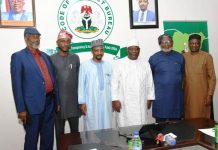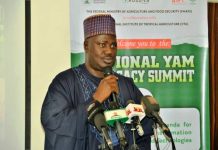The Ministry of Humanitarian Affairs, Disaster Management and Social Development Sadiya Umar Farouq says the federal government is determined to ensure that Nigerian Refugees are retuned to the country in safety and in dignity.
The Minister made the remark when a delegation from the United Nations High Commissioner For Refugees in Geneva paid her a courtesy visit.
The Minister who was represented by the Permanent Secretary Mr Bashir Nura Alkali said that one of the Ministry’s priorities is to sustain the process of bringing back the refugees which includes development of sustainable home-grown models for rehabilitation, reintegration, and reconstruction.
“Being the coordination agency, the Ministry has facilitated the adoption of National Policies including the IDP policy which incorporated the provisions of the Kampala Convention. The policy is an overarching framework that guides operations while ensuring coordinated and coherence approach.
“To ensure the provision of a sustainable durable solution, the Ministry in collaboration with relevant organizations has launched a homegrown strategy, the Humanitarian Peace Development Framework, in line with global best practices and in tandem with the President Buhari administration plan.
“The Nigeria government is poised towards ensuring the voluntary return of Nigeria Refugees in neighboring countries as a result of the activities of Boko Haram and we are committed to implement this in line with international best practices. The Nigeria government is presently hosting a large number of Refugees from neighboring countries and we are working hard in collaboration with UNHCR to provide adequate protection to the refugees and the asylum seekers”.
Earlier, the leader of the UNHCR delegation and Assistant High Commissioner for Operations, Raouf Mazou thanked the government of Nigeria for guiding them through their tour of IDP camps in Maiduguri, stating that their visit is to interact with the federal government and share ideas and views on some of the humanitarian challenges.
“This visit is first, to express our solidarity. This is a difficult situation. In Borno particularly, there are close to three million Internally Displaced Persons. From the Humanitarian point of view, this is a very serious problem that the country is facing, which requires the support of the International Communities.
“We also came to discuss with the state government of Borno on the return of some refugees. In Niger Republic, there are 170,000 Nigerian Refugees and 16,000 in Chad. Some of them may want to come back to Nigeria, so how do we ensure that they can come back and what form of support systems and security needs to be in place for them to come back.
“We also want to ensure that those already in the country receive assistance and if possible, included and integrated in the support that is available for the host population”.
Earlier, the Honourable Federal Commissioner for Refugees Mrs Imaan Suleiman-Ibrahim
congratulated the UNHCR on the 70th commemoration of the 1951 Convention and applauded the cordial collaboration between the Commission and UNHCR in Nigeria.
Mrs Suleiman-Ibrahim acknowledged the ongoing registration of over 70,000 Cameroonian Refugees in Nigeria
“I am happy to report that Nigeria has one of the best working processes for Refugees and Asylum seekers by ensuring that cases are looked into holistically and timely to ensure that there are no backlogs in the system.
“The Federal Government of Nigeria through the Armed Forces and the Multi – Joint Task Forces have been relentless in the fight against the insurgents – Boko Haram and ISWAP to ensure that areas of return are secured and now IDPs and returnees are being resettled in safety and dignity”.
The Delegation included the Country Representative at UNHCR Chansa Kapaya, Nigeria Deputy Representative (Protection) at UNHCR John McKissick and the Refugee Status Determination(RSD) Unit ·(NCFRMI) Mr Murdakai Titus.
NNEKA IKEM ANIBEZE
SA MEDIA






